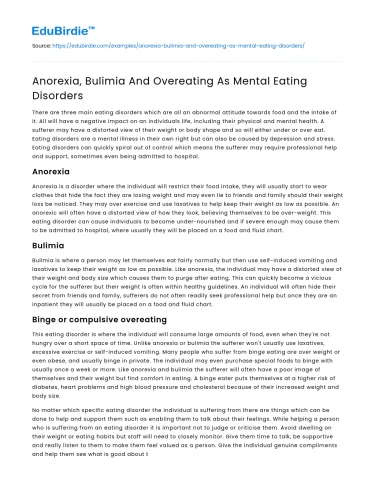There are three main eating disorders which are all an abnormal attitude towards food and the intake of it. All will have a negative impact on an individuals life, including their physical and mental health. A sufferer may have a distorted view of their weight or body shape and so will either under or over eat. Eating disorders are a mental illness in their own right but can also be caused by depression and stress. Eating disorders can quickly spiral out of control which means the sufferer may require professional help and support, sometimes even being admitted to hospital.
Anorexia
Anorexia is a disorder where the individual will restrict their food intake, they will usually start to wear clothes that hide the fact they are losing weight and may even lie to friends and family should their weight loss be noticed. They may over exercise and use laxatives to help keep their weight as low as possible. An anorexic will often have a distorted view of how they look, believing themselves to be over-weight. This eating disorder can cause individuals to become under-nourished and if severe enough may cause them to be admitted to hospital, where usually they will be placed on a food and fluid chart.
Save your time!
We can take care of your essay
- Proper editing and formatting
- Free revision, title page, and bibliography
- Flexible prices and money-back guarantee
Bulimia
Bulimia is where a person may let themselves eat fairly normally but then use self-induced vomiting and laxatives to keep their weight as low as possible. Like anorexia, the individual may have a distorted view of their weight and body size which causes them to purge after eating. This can quickly become a vicious cycle for the sufferer but their weight is often within healthy guidelines. An individual will often hide their secret from friends and family, sufferers do not often readily seek professional help but once they are an inpatient they will usually be placed on a food and fluid chart.
Binge or compulsive overeating
This eating disorder is where the individual will consume large amounts of food, even when they're not hungry over a short space of time. Unlike anorexia or bulimia the sufferer won't usually use laxatives, excessive exercise or self-induced vomiting. Many people who suffer from binge eating are over weight or even obese, and usually binge in private. The individual may even purchase special foods to binge with usually once a week or more. Like anorexia and bulimia the sufferer will often have a poor image of themselves and their weight but find comfort in eating. A binge eater puts themselves at a higher risk of diabetes, heart problems and high blood pressure and cholesterol because of their increased weight and body size.
No matter which specific eating disorder the individual is suffering from there are things which can be done to help and support them such as enabling them to talk about their feelings. While helping a person who is suffering from an eating disorder it is important not to judge or criticise them. Avoid dwelling on their weight or eating habits but staff will need to closely monitor. Give them time to talk, be supportive and really listen to them to make them feel valued as a person. Give the individual genuine compliments and help them see what is good about them. Once the individual feels ready or discharge is being discussed encourage them to find local support groups, assist them on this task and even suggest a friend could to go with them. Make suggestions rather than give instructions about how they can change as instructing, confrontation or being highly critical will not help the individual and may even break the cycle of support being offered. Learning more about eating disorders could be beneficial to both the supporting person and the sufferer because learning could give more knowledge and help towards a better understanding of the specific eating disorder. As recovery from an eating disorder or mental health illness can be a lengthy progress there will need to be a long-term commitment towards helping the person suffering the eating disorder. Over the course of recovery, there could even be times of relapse, it is important to remember to be supportive as relapses do not mean failure on either side and so long as the person suffering from the eating disorder still has a strong desire to want to manage better and recover as best as they can then treatment and support will still be beneficial.
Did you like this example?
Make sure you submit a unique essay
Our writers will provide you with an essay sample written from scratch: any topic, any deadline, any instructions.
Cite this paper
-
APA
-
MLA
-
Harvard
-
Vancouver
Anorexia, Bulimia And Overeating As Mental Eating Disorders.
(2021, September 21). Edubirdie. Retrieved December 23, 2024, from https://edubirdie.com/examples/anorexia-bulimia-and-overeating-as-mental-eating-disorders/
“Anorexia, Bulimia And Overeating As Mental Eating Disorders.” Edubirdie, 21 Sept. 2021, edubirdie.com/examples/anorexia-bulimia-and-overeating-as-mental-eating-disorders/
Anorexia, Bulimia And Overeating As Mental Eating Disorders. [online].
Available at: <https://edubirdie.com/examples/anorexia-bulimia-and-overeating-as-mental-eating-disorders/> [Accessed 23 Dec. 2024].
Anorexia, Bulimia And Overeating As Mental Eating Disorders [Internet]. Edubirdie.
2021 Sept 21 [cited 2024 Dec 23].
Available from: https://edubirdie.com/examples/anorexia-bulimia-and-overeating-as-mental-eating-disorders/
copy






 Stuck on your essay?
Stuck on your essay?

